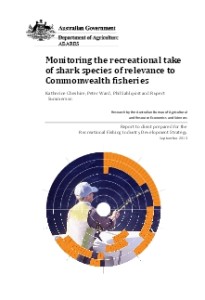Monitoring the recreational take of sharks in Australia
Monitoring the recreational take of shark species of relevance to Commonwealth fisheries
Katherine Cheshire, Peter Ward, Phil Sahlqvist and Rupert Summerson
Published on 26. September 2013
OVERVIEW
The Recreational Fishing Industry Development Strategy (RFIDS) study identified shark species of interest to recreational fishing and the Australian Government.
-
Many sharks and rays are endemic to Australia. They are characterised by long life spans, slow growth rates, late maturation and low fecundity, which may make them vulnerable to over-exploitation and generally slow to recover. Sharks need careful management.
-
Several species of shark are highly sought-after by recreational anglers for sport or for consumption, particularly in Australia’s southern states. Many of these species are also a bycatch of Commonwealth fisheries. Several shark species, including gummy shark, are important to commercial fisheries.
-
The RFIDS study was partly a response to the listing of several shark species under the Convention on the Conservation of Migratory Species of Wild Animals (also known as CMS or the Bonn Convention) in 2008. This had the potential to affect recreational fishing in Australia through automatic listing under the Environment Protection and Biodiversity Conservation Act 1999 (EPBC Act). A special amendment subsequently provided an exception to the Act’s offence provisions and allowed recreational fishing for mako and porbeagle sharks to continue.
- The RFIDS study will facilitate quick access to relevant information for management. It also highlights key information gaps.
 PDF – DOWNLOAD
PDF – DOWNLOAD
